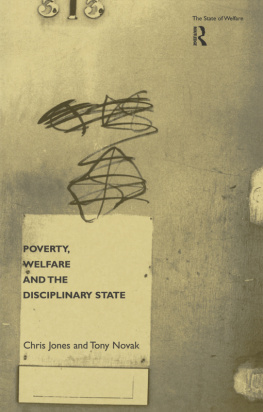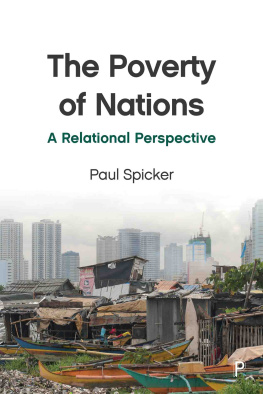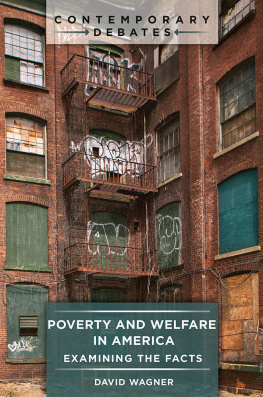Jones Chris - Poverty, Welfare and the Disciplinary State
Here you can read online Jones Chris - Poverty, Welfare and the Disciplinary State full text of the book (entire story) in english for free. Download pdf and epub, get meaning, cover and reviews about this ebook. City: Großbritannien, year: 2012, publisher: Taylor and Francis, genre: Politics. Description of the work, (preface) as well as reviews are available. Best literature library LitArk.com created for fans of good reading and offers a wide selection of genres:
Romance novel
Science fiction
Adventure
Detective
Science
History
Home and family
Prose
Art
Politics
Computer
Non-fiction
Religion
Business
Children
Humor
Choose a favorite category and find really read worthwhile books. Enjoy immersion in the world of imagination, feel the emotions of the characters or learn something new for yourself, make an fascinating discovery.
- Book:Poverty, Welfare and the Disciplinary State
- Author:
- Publisher:Taylor and Francis
- Genre:
- Year:2012
- City:Großbritannien
- Rating:4 / 5
- Favourites:Add to favourites
- Your mark:
- 80
- 1
- 2
- 3
- 4
- 5
Poverty, Welfare and the Disciplinary State: summary, description and annotation
We offer to read an annotation, description, summary or preface (depends on what the author of the book "Poverty, Welfare and the Disciplinary State" wrote himself). If you haven't found the necessary information about the book — write in the comments, we will try to find it.
Poverty, Welfare and the Disciplinary State — read online for free the complete book (whole text) full work
Below is the text of the book, divided by pages. System saving the place of the last page read, allows you to conveniently read the book "Poverty, Welfare and the Disciplinary State" online for free, without having to search again every time where you left off. Put a bookmark, and you can go to the page where you finished reading at any time.
Font size:
Interval:
Bookmark:
Poverty, Welfare and the Disciplinary State
Poverty, Welfare and the Disciplinary State argues that the social-democratic welfare state which came into being in Britain after the second world war should now be seen as a brief departure from a more ruthless form of social policy that has traditionally characterised the states response to some of the poorest people in society. The book argues that since 1979 there has been a new ruthlessness in social policy which has been influential in the creation of what it describes as the disciplinary state, which is evident in a number of advanced capitalist societies and shows no sign of being reined back. In this context the book examines such issues as:
- the current dynamics of poverty in Britain, drawing on similar developments in Europe and the US
- the major areas of social policy within which this abandonment and demonisation of the poor is taking place
- the historical antecedents to this relationship between the state and the poor
- the creation and expansion of a welfare state that characterised the era of social democracy until the mid-1970s and, from the point of view of the poor, was limited and conditional
- the ideology and organisation of the new right and of New Labour
- the new terrain on which the struggle over the future of welfare and social policy must take place.
It will appeal to all students of social policy, social work and sociology.
Chris Jones is Professor of Social Policy and Social Work at Liverpool University; Tony Novak is Lecturer in Social Policy also at Liverpool University.
The State of Welfare
Edited by Mary Langan
Nearly half a century after its post-war consolidation, the British welfare state is once again at the centre of political controversy. After a decade in which the role of the state in the provision of welfare was steadily reduced in favour of the private, voluntary and informal sectors, with relatively little public debate or resistance, the further extension of the new mixed economy of welfare in the spheres of health and education became a major political issue in the early 1990s. At the same time the impact of deepening recession has begun to expose some of the deficiencies of market forces in areas such as housing and income maintenance, where their role had expanded dramatically during the 1980s. The State of Welfare provides a forum for continuing the debate about the services we need as we enter the twenty-first century.
Titles of related interest also in The State of Welfare series:
Taking Child Abuse Seriously
The Violence Against Children Study Group
Women, Oppression and Social Work
Edited by Mary Langan and Lesley Day
Managing Poverty: The Limits of Social Assistance
Carol Walker
Towards a Post-Fordist Welfare State?
Roger Burrows and Brian Loader
Working with Men: Feminism and Social Work
Edited by Kate Cavanagh and Viviene E. Cree
Social Theory, Social Change and Social Work
Edited by Nigel Parton
Working for Equality in Health
Edited by Paul Bywaters and Eileen McLeod
Social Action for Children and Families
Edited by Crescy Cannan and Chris Warren
Child Protection and Family Support
Nigel Parton
Social Work and Child Abuse
David Merrick
Towards a Classless Society?
Edited by Helen Jones
Poverty, Welfare and the Disciplinary State
Chris Jones and Tony Novak

First published 1999
by Routledge
11 New Fetter Lane, London EC4P 4EE
Simultaneously published in the USA and Canada
by Routledge
29 West 35th Street, New York, NY 10001
This edition published in the Taylor & Francis e-Library, 2001.
1999 Chris Jones and Tony Novak
All rights reserved. No part of this book may be reprinted or reproduced or utilized in any form or by any electronic, mechanical, or other means, now known or hereafter invented, including photocopying and recording, or in any information storage or retrieval system, without permission in writing from the publishers.
British Library Cataloguing in Publication Data
A catalogue record for this book is available from the British Library
Library of Congress Cataloging in Publication Data
A record for this book has been requested
ISBN 0 415 18289 1 (hbk)
ISBN 0 415 18290 5 (pbk)
ISBN 0-203-00366-7 Master e-book ISBN
ISBN 0-203-17314-7 (Glassbook Format)
Contents
Series editors preface
State welfare policies reflect changing perceptions of key sources of social instability. In the first half of the twentieth century from Bismarck to Beveridge the welfare state emerged as a set of policies and institutions which were, in the main, a response to the problem of labour, the threat of class conflict. The major objective was to contain and integrate the labour movement. In the post-war decades, as this threat receded, the welfare state became consolidated as a major employer and provider of a wide range of services and benefits to every section of society. Indeed it increasingly became the focus of blame for economic decline and was condemned for its inefficiency and ineffectiveness.
Since the end of the Cold War the major fear of capitalist societies is no longer class conflict but the socially disintegrative consequences of the system itself. A heightened awareness of the manifestations of social instability including unemployment and homelessness, delinquency, drug abuse and crime, divorce, single parenthood and child abuse reflects deepseated apprehensions about the future of modern society.
The role of state social policy in the ClintonBlair era is to restrain and regulate the destructive effects of market forces symbolised by the Reagan Thatcher years. On both sides of the Atlantic governments have rejected the old polarities of left and right, the goals of both comprehensive state intervention and rampant free-market individualism. In its pursuit of a third way the New Labour government which came to power in Britain in May 1997 has sought to define a new role for government at a time when politics has largely retreated from its traditional concerns about the nature and direction of society.
For Tony Blair, the third way is based on values, not on outdated ideology (The Times, 25 July 1998). Its starting point is the conviction that people should adjust to the diminished possibilities offered by a society in which change for the better seems no longer very feasible. This is how Anthony Giddens, director of the London School of Economics and a key intellectual influence on New Labour, puts it: In a situation where change has long ceased to be all progress, if it ever was, and where progress has become eminently disputable, the preservation and renewal of tradition, as well as of environmental resources, take on a particular urgency (Giddens 1994: 49).
What are the values of the third way? According to Tony Blair, the people of Middle England distrust heavy ideology but want security and stability; they want to refashion the bonds of community life and although they believe in the market economy, they do not believe that the only values that matter are those of the market place (The Times, 25 July 1998). The values of the third way reflect and shape a traditional and conservative response to the dynamic and unpredictable world of the late 1990s.
The view expressed by Michael Jacobs (1998), a leading participant in the revived Fabian Society, that we live in a strongly individualised society which is falling apart is widely shared. For him, the fundamental principle of the third way is to balance the autonomous demands of the individual with the need for social cohesion or community. A key New Labour concept that follows from this preoccupation with community is that of social exclusion. Proclaimed the governments most important innovation when it was announced in August 1997, the social-exclusion unit is at the heart of New Labours flagship social-policy initiative the welfare-to-work programme. The preoccupation with social exclusion indicates a concern about tendencies towards fragmentation in society and a self-conscious commitment to policies which seek to integrate atomised individuals and thus to enhance social cohesion.
Next pageFont size:
Interval:
Bookmark:
Similar books «Poverty, Welfare and the Disciplinary State»
Look at similar books to Poverty, Welfare and the Disciplinary State. We have selected literature similar in name and meaning in the hope of providing readers with more options to find new, interesting, not yet read works.
Discussion, reviews of the book Poverty, Welfare and the Disciplinary State and just readers' own opinions. Leave your comments, write what you think about the work, its meaning or the main characters. Specify what exactly you liked and what you didn't like, and why you think so.








